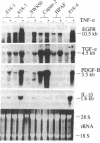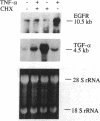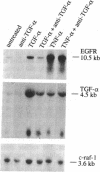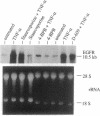Abstract
Recombinant human tumor necrosis factor (TNF)-alpha increased the expression of epidermal growth factor receptor (EGFR) mRNA and protein in all of six human pancreatic carcinoma cell lines tested. In addition, TNF-alpha increased the expression of an EGFR ligand, transforming growth factor (TGF)-alpha, at the mRNA and protein level in all cell lines. Increased expression of EGFR protein was associated with elevated steady-state EGFR mRNA levels. Nuclear run-on analysis showed that increase in EGFR mRNA was due to an increased rate of transcription. Induction of EGFR mRNA expression by TNF-alpha was abrogated by cycloheximide but occurred independently of TNF-alpha-induced production of TGF-alpha protein. Protein kinase A or Gi-type guanine nucleotide-binding proteins were not involved in this process as assessed by using appropriate stimulators and inhibitors of these signal transduction pathways. By contrast, staurosporine, an inhibitor of protein kinase C, partially inhibited, and 4-bromophenacyl bromide, a phospholipase inhibitor, completely inhibited TNF-alpha-dependent EGFR mRNA expression. The phospholipase C-specific inhibitor tricyclodecan-9-yl xanthogenate did not alter TNF-alpha-dependent EGFR mRNA expression, suggesting that phospholipase A2 is involved in the modulation of EGFR expression by TNF-alpha. The simultaneous induction of a ligand/receptor system by TNF-alpha suggests that this cytokine modulates autocrine growth-regulatory pathways in pancreatic cancer cells.
Full text
PDF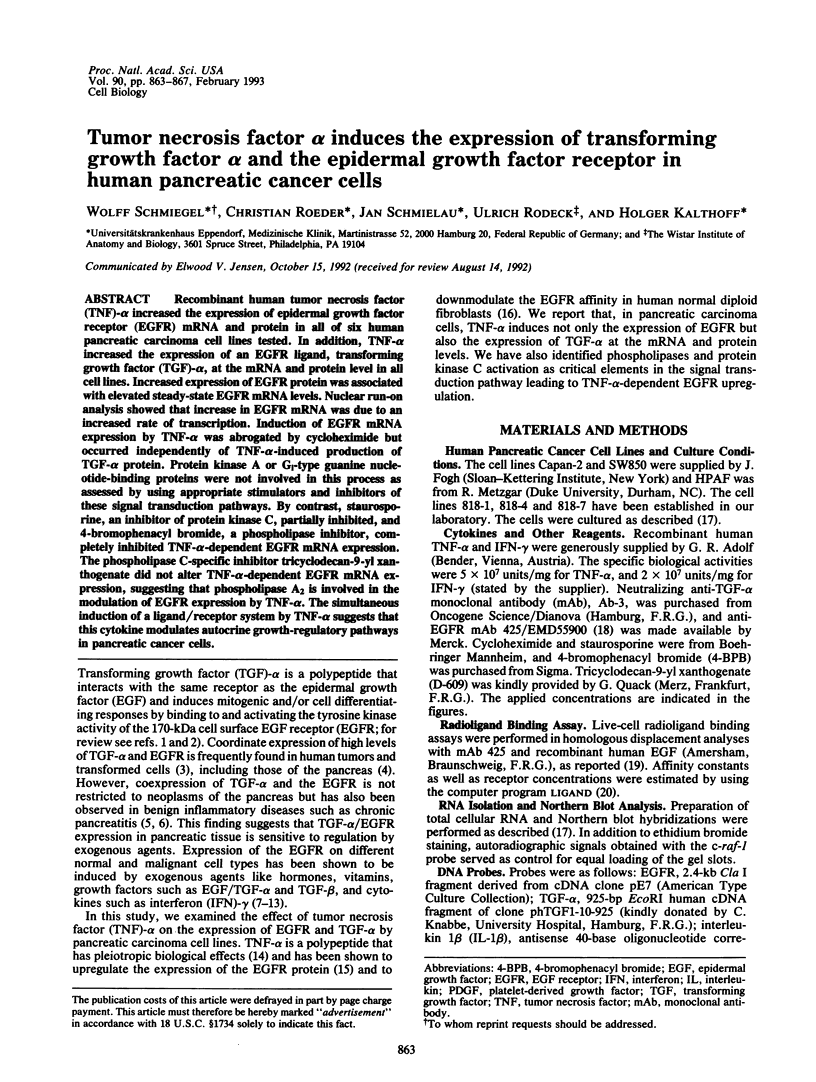
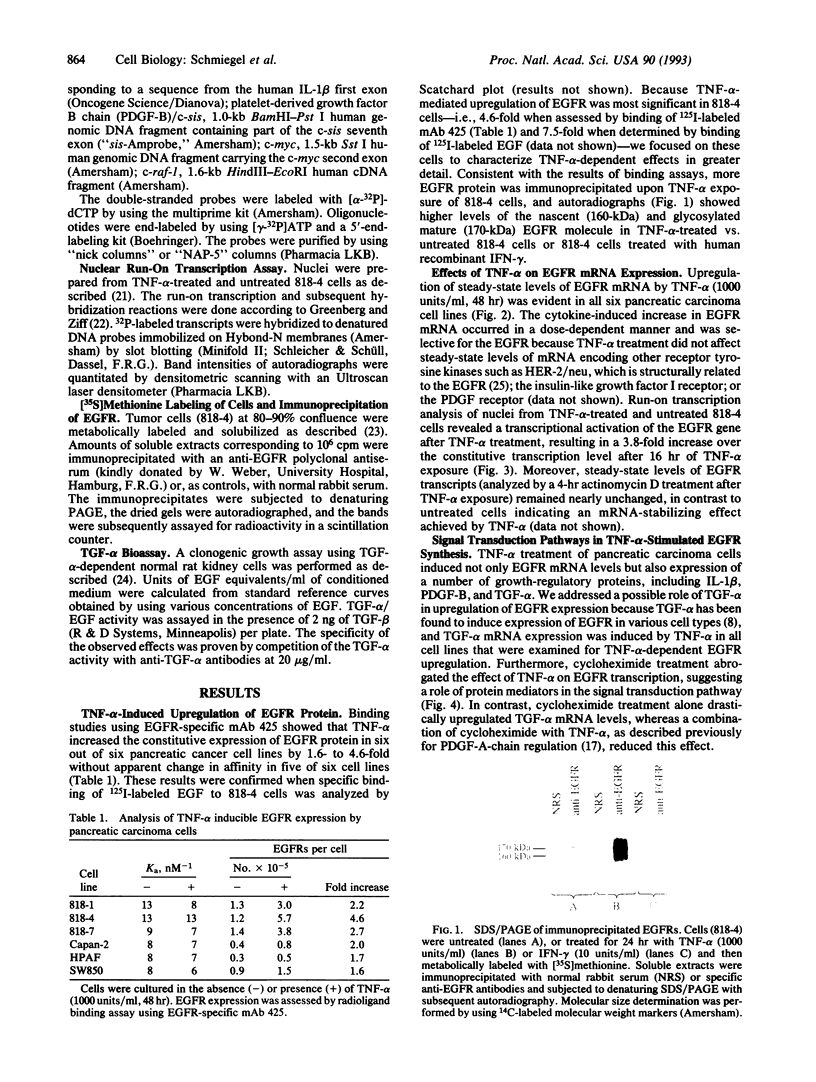
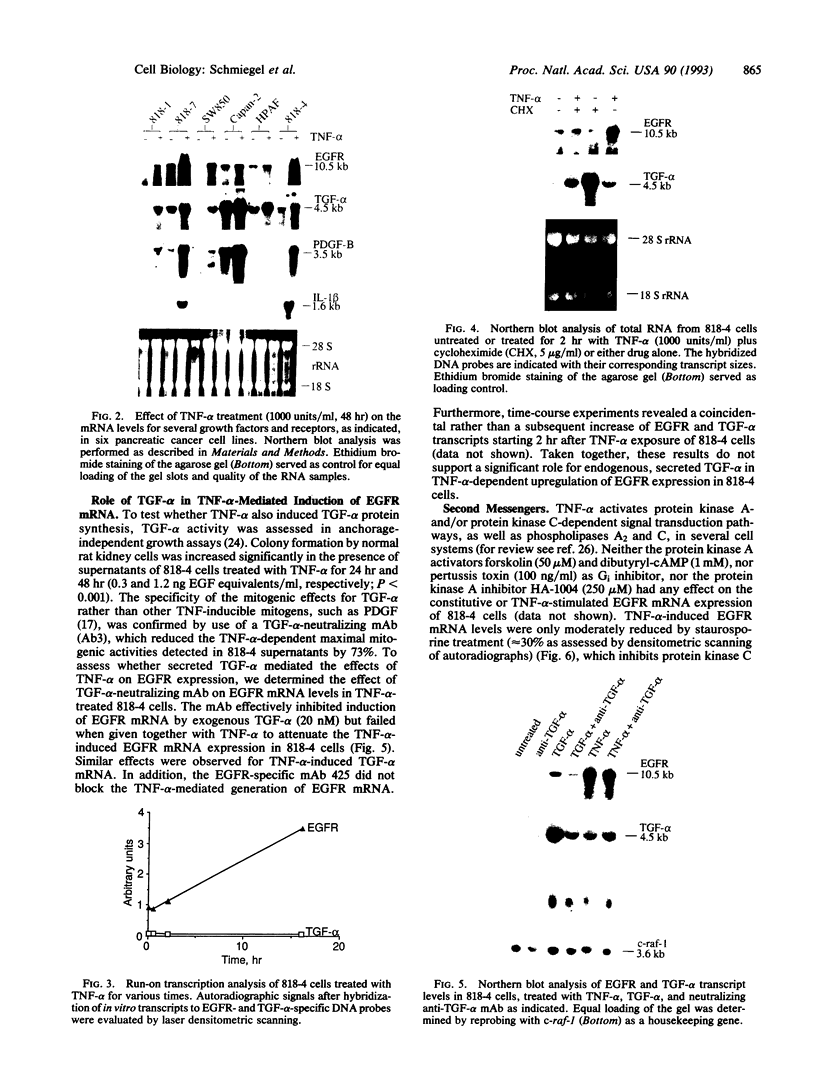
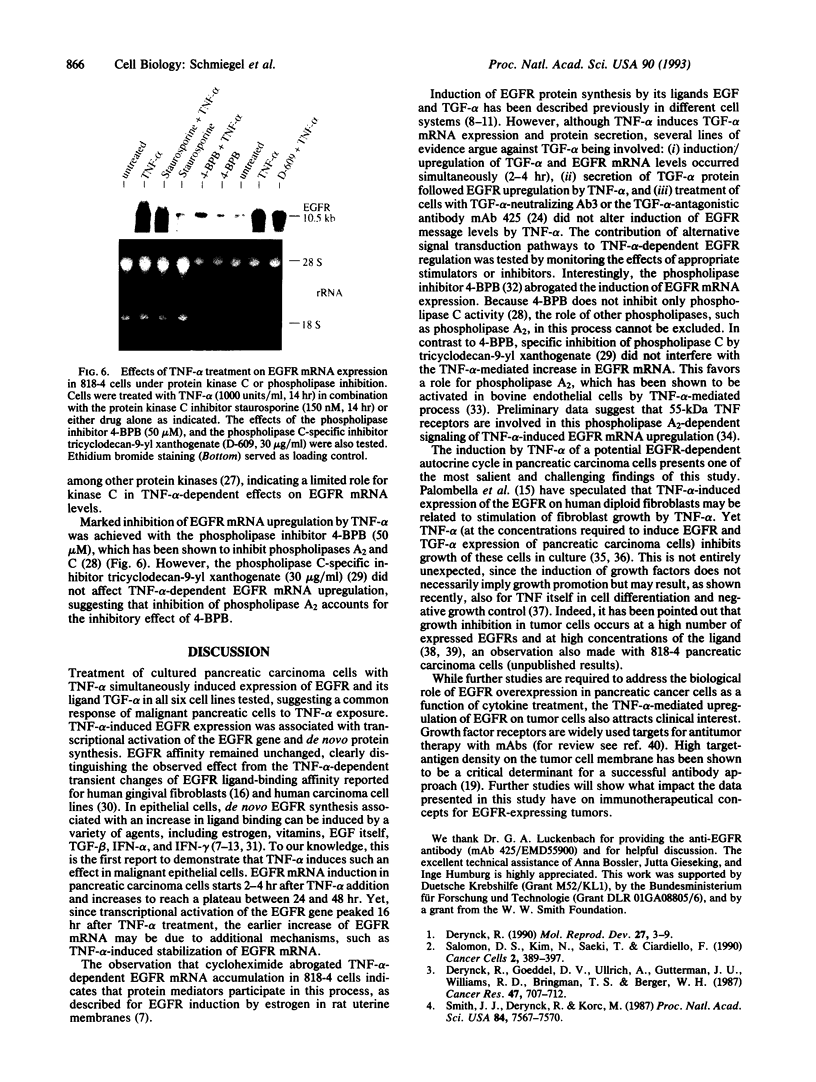
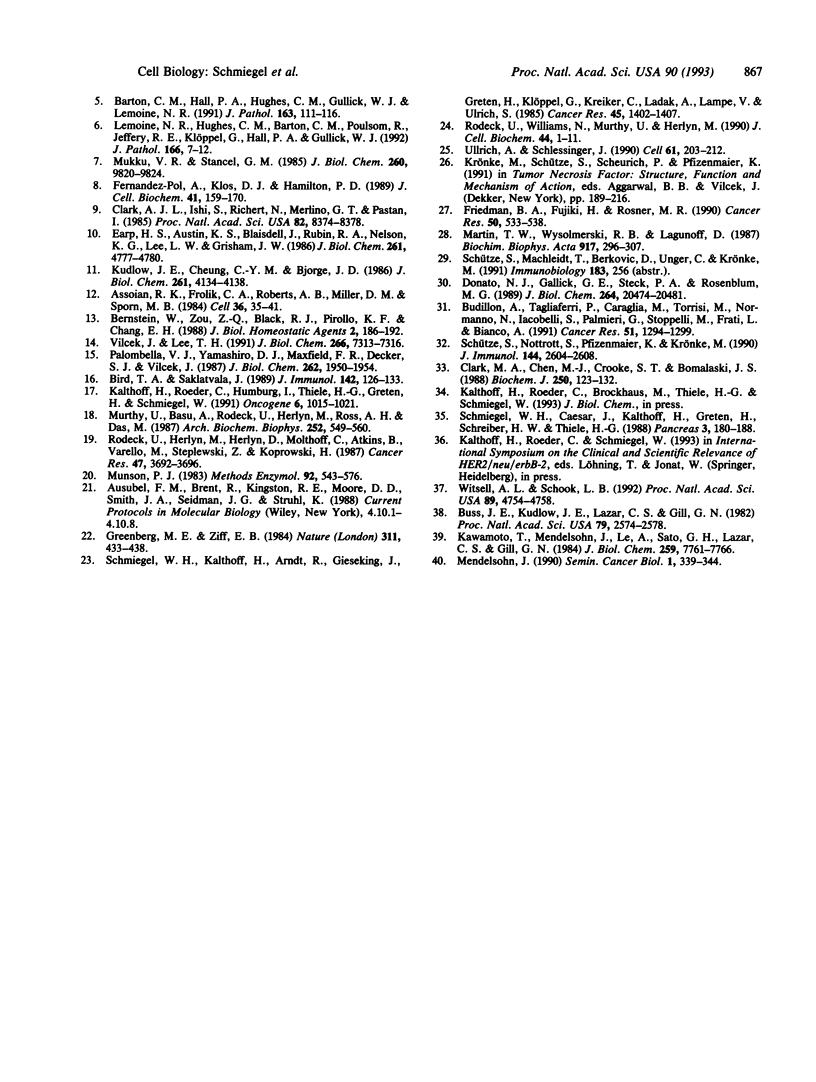
Images in this article
Selected References
These references are in PubMed. This may not be the complete list of references from this article.
- Assoian R. K., Frolik C. A., Roberts A. B., Miller D. M., Sporn M. B. Transforming growth factor-beta controls receptor levels for epidermal growth factor in NRK fibroblasts. Cell. 1984 Jan;36(1):35–41. doi: 10.1016/0092-8674(84)90071-0. [DOI] [PubMed] [Google Scholar]
- Barton C. M., Hall P. A., Hughes C. M., Gullick W. J., Lemoine N. R. Transforming growth factor alpha and epidermal growth factor in human pancreatic cancer. J Pathol. 1991 Feb;163(2):111–116. doi: 10.1002/path.1711630206. [DOI] [PubMed] [Google Scholar]
- Bernstein W., Zou Z. Q., Black R. J., Pirollo K. F., Chang E. H. Association of interferon-gamma induced growth inhibition and modulation of epidermal growth factor receptor gene expression in squamous cell carcinoma cell lines. J Biol Regul Homeost Agents. 1988 Oct-Dec;2(4):186–192. [PubMed] [Google Scholar]
- Bird T. A., Saklatvala J. IL-1 and TNF transmodulate epidermal growth factor receptors by a protein kinase C-independent mechanism. J Immunol. 1989 Jan 1;142(1):126–133. [PubMed] [Google Scholar]
- Budillon A., Tagliaferri P., Caraglia M., Torrisi M. R., Normanno N., Iacobelli S., Palmieri G., Stoppelli M. P., Frati L., Bianco A. R. Upregulation of epidermal growth factor receptor induced by alpha-interferon in human epidermoid cancer cells. Cancer Res. 1991 Feb 15;51(4):1294–1299. [PubMed] [Google Scholar]
- Buss J. E., Kudlow J. E., Lazar C. S., Gill G. N. Altered epidermal growth factor (EGF)-stimulated protein kinase activity in variant A431 cells with altered growth responses to EGF. Proc Natl Acad Sci U S A. 1982 Apr;79(8):2574–2578. doi: 10.1073/pnas.79.8.2574. [DOI] [PMC free article] [PubMed] [Google Scholar]
- Clark A. J., Ishii S., Richert N., Merlino G. T., Pastan I. Epidermal growth factor regulates the expression of its own receptor. Proc Natl Acad Sci U S A. 1985 Dec;82(24):8374–8378. doi: 10.1073/pnas.82.24.8374. [DOI] [PMC free article] [PubMed] [Google Scholar]
- Clark M. A., Chen M. J., Crooke S. T., Bomalaski J. S. Tumour necrosis factor (cachectin) induces phospholipase A2 activity and synthesis of a phospholipase A2-activating protein in endothelial cells. Biochem J. 1988 Feb 15;250(1):125–132. doi: 10.1042/bj2500125. [DOI] [PMC free article] [PubMed] [Google Scholar]
- Derynck R., Goeddel D. V., Ullrich A., Gutterman J. U., Williams R. D., Bringman T. S., Berger W. H. Synthesis of messenger RNAs for transforming growth factors alpha and beta and the epidermal growth factor receptor by human tumors. Cancer Res. 1987 Feb 1;47(3):707–712. [PubMed] [Google Scholar]
- Derynck R. Transforming growth factor-alpha. Mol Reprod Dev. 1990 Sep;27(1):3–9. doi: 10.1002/mrd.1080270104. [DOI] [PubMed] [Google Scholar]
- Donato N. J., Gallick G. E., Steck P. A., Rosenblum M. G. Tumor necrosis factor modulates epidermal growth factor receptor phosphorylation and kinase activity in human tumor cells. Correlation with cytotoxicity. J Biol Chem. 1989 Dec 5;264(34):20474–20481. [PubMed] [Google Scholar]
- Earp H. S., Austin K. S., Blaisdell J., Rubin R. A., Nelson K. G., Lee L. W., Grisham J. W. Epidermal growth factor (EGF) stimulates EGF receptor synthesis. J Biol Chem. 1986 Apr 15;261(11):4777–4780. [PubMed] [Google Scholar]
- Fernandez-Pol J. A., Klos D. J., Hamilton P. D. Modulation of transforming growth factor alpha-dependent expression of epidermal growth factor receptor gene by transforming growth factor beta, triiodothyronine, and retinoic acid. J Cell Biochem. 1989 Nov;41(3):159–170. doi: 10.1002/jcb.240410306. [DOI] [PubMed] [Google Scholar]
- Friedman B., Fujiki H., Rosner M. R. Regulation of the epidermal growth factor receptor by growth-modulating agents: effects of staurosporine, a protein kinase inhibitor. Cancer Res. 1990 Feb 1;50(3):533–538. [PubMed] [Google Scholar]
- Greenberg M. E., Ziff E. B. Stimulation of 3T3 cells induces transcription of the c-fos proto-oncogene. Nature. 1984 Oct 4;311(5985):433–438. doi: 10.1038/311433a0. [DOI] [PubMed] [Google Scholar]
- Grimes S. R., Wolfe S. A., Anderson J. V., Stein G. S., Stein J. L. Structural and functional analysis of the rat testis-specific histone H1t gene. J Cell Biochem. 1990 Sep;44(1):1–17. doi: 10.1002/jcb.240440102. [DOI] [PubMed] [Google Scholar]
- Kalthoff H., Roeder C., Humburg I., Thiele H. G., Greten H., Schmiegel W. Modulation of platelet-derived growth factor A- and B-chain/c-sis mRNA by tumor necrosis factor and other agents in adenocarcinoma cells. Oncogene. 1991 Jun;6(6):1015–1021. [PubMed] [Google Scholar]
- Kawamoto T., Mendelsohn J., Le A., Sato G. H., Lazar C. S., Gill G. N. Relation of epidermal growth factor receptor concentration to growth of human epidermoid carcinoma A431 cells. J Biol Chem. 1984 Jun 25;259(12):7761–7766. [PubMed] [Google Scholar]
- Kudlow J. E., Cheung C. Y., Bjorge J. D. Epidermal growth factor stimulates the synthesis of its own receptor in a human breast cancer cell line. J Biol Chem. 1986 Mar 25;261(9):4134–4138. [PubMed] [Google Scholar]
- Lemoine N. R., Hughes C. M., Barton C. M., Poulsom R., Jeffery R. E., Klöppel G., Hall P. A., Gullick W. J. The epidermal growth factor receptor in human pancreatic cancer. J Pathol. 1992 Jan;166(1):7–12. doi: 10.1002/path.1711660103. [DOI] [PubMed] [Google Scholar]
- Martin T. W., Wysolmerski R. B., Lagunoff D. Phosphatidylcholine metabolism in endothelial cells: evidence for phospholipase A and a novel Ca2+-independent phospholipase C. Biochim Biophys Acta. 1987 Feb 14;917(2):296–307. doi: 10.1016/0005-2760(87)90134-2. [DOI] [PubMed] [Google Scholar]
- Mendelsohn J. The epidermal growth factor receptor as a target for therapy with antireceptor monoclonal antibodies. Semin Cancer Biol. 1990 Oct;1(5):339–344. [PubMed] [Google Scholar]
- Mukku V. R., Stancel G. M. Regulation of epidermal growth factor receptor by estrogen. J Biol Chem. 1985 Aug 15;260(17):9820–9824. [PubMed] [Google Scholar]
- Munson P. J. LIGAND: a computerized analysis of ligand binding data. Methods Enzymol. 1983;92:543–576. doi: 10.1016/0076-6879(83)92044-x. [DOI] [PubMed] [Google Scholar]
- Murthy U., Basu A., Rodeck U., Herlyn M., Ross A. H., Das M. Binding of an antagonistic monoclonal antibody to an intact and fragmented EGF-receptor polypeptide. Arch Biochem Biophys. 1987 Feb 1;252(2):549–560. doi: 10.1016/0003-9861(87)90062-2. [DOI] [PubMed] [Google Scholar]
- Palombella V. J., Yamashiro D. J., Maxfield F. R., Decker S. J., Vilcek J. Tumor necrosis factor increases the number of epidermal growth factor receptors on human fibroblasts. J Biol Chem. 1987 Feb 15;262(5):1950–1954. [PubMed] [Google Scholar]
- Rodeck U., Herlyn M., Herlyn D., Molthoff C., Atkinson B., Varello M., Steplewski Z., Koprowski H. Tumor growth modulation by a monoclonal antibody to the epidermal growth factor receptor: immunologically mediated and effector cell-independent effects. Cancer Res. 1987 Jul 15;47(14):3692–3696. [PubMed] [Google Scholar]
- Salomon D. S., Kim N., Saeki T., Ciardiello F. Transforming growth factor-alpha: an oncodevelopmental growth factor. Cancer Cells. 1990 Dec;2(12):389–397. [PubMed] [Google Scholar]
- Schmiegel W. H., Caesar J., Kalthoff H., Greten H., Schreiber H. W., Thiele H. G. Antiproliferative effects exerted by recombinant human tumor necrosis factor-alpha (TNF-alpha) and interferon-gamma (IFN-gamma) on human pancreatic tumor cell lines. Pancreas. 1988;3(2):180–188. doi: 10.1097/00006676-198804000-00012. [DOI] [PubMed] [Google Scholar]
- Schmiegel W. H., Kalthoff H., Arndt R., Gieseking J., Greten H., Klöppel G., Kreiker C., Ladak A., Lampe V., Ulrich S. Monoclonal antibody-defined human pancreatic cancer-associated antigens. Cancer Res. 1985 Mar;45(3):1402–1407. [PubMed] [Google Scholar]
- Schütze S., Nottrott S., Pfizenmaier K., Krönke M. Tumor necrosis factor signal transduction. Cell-type-specific activation and translocation of protein kinase C. J Immunol. 1990 Apr 1;144(7):2604–2608. [PubMed] [Google Scholar]
- Smith J. J., Derynck R., Korc M. Production of transforming growth factor alpha in human pancreatic cancer cells: evidence for a superagonist autocrine cycle. Proc Natl Acad Sci U S A. 1987 Nov;84(21):7567–7570. doi: 10.1073/pnas.84.21.7567. [DOI] [PMC free article] [PubMed] [Google Scholar]
- Ullrich A., Schlessinger J. Signal transduction by receptors with tyrosine kinase activity. Cell. 1990 Apr 20;61(2):203–212. doi: 10.1016/0092-8674(90)90801-k. [DOI] [PubMed] [Google Scholar]
- Vilcek J., Lee T. H. Tumor necrosis factor. New insights into the molecular mechanisms of its multiple actions. J Biol Chem. 1991 Apr 25;266(12):7313–7316. [PubMed] [Google Scholar]
- Witsell A. L., Schook L. B. Tumor necrosis factor alpha is an autocrine growth regulator during macrophage differentiation. Proc Natl Acad Sci U S A. 1992 May 15;89(10):4754–4758. doi: 10.1073/pnas.89.10.4754. [DOI] [PMC free article] [PubMed] [Google Scholar]




